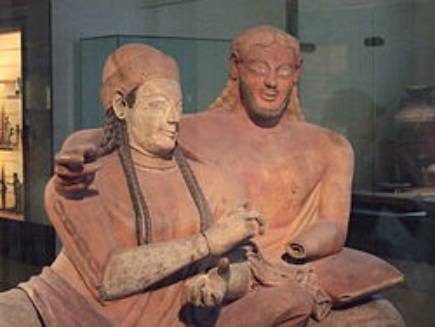The Etruscans - nature, sex, instinct and emotion
D.H. Lawrence (see his work Etruscan Places) was fascinated by Etruscan culture and its emphasis on sensuality. He felt that morality and rationality destroyed this culture - which in his mind was based on nature, sex, instinct and emotion.
Etruscans is the name given to a people who lived north of Rome, particularly in what is today named Tuscany (itself a name derived from the Etruscans). Etruscan culture had its strongest position in the period from 700 B.C. to 500 B.C. After that, the Republic of Rome rose to power and gradually took over the political power in the region. Etruscan culture lived on and was gradually integrated into Roman culture when the Roman Republic consolidated its power and started its expansion around the 3rd century B.C. Etruscan art is strongly influenced by Greek art, as a result of its regular contact with Greek settlements in the area. Its art is notably more sensual in its expression than both Greek and Roman artworks, as can be particularly seen in the tomb paintings. Its bronze sculpture is extremely refined and advanced. Etruscan language is related only to other members of what is called the Tyrsenian language family, a non-Indo-European language.
D.H. Lawrence admired the Etruscans for their focus on the sensual aspects of life, where dance, music, feasts and erotism held an important role. In his travel book on Etruscan places he expands on this theme and emphasizes the significant difference between the Romans and the Etruscans in the outlook on the purpose of life.
D.H. Lawrence admired the Etruscans for their focus on the sensual aspects of life, where dance, music, feasts and erotism held an important role. In his travel book on Etruscan places he expands on this theme and emphasizes the significant difference between the Romans and the Etruscans in the outlook on the purpose of life.
